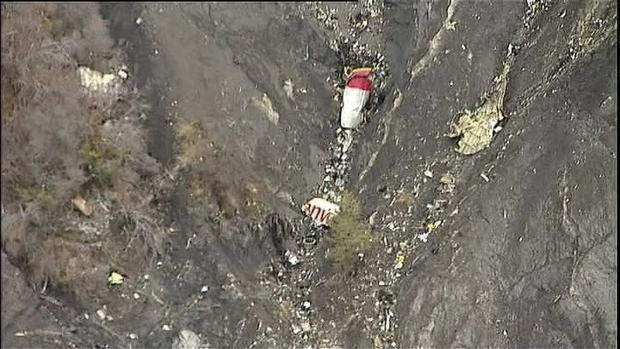Will Germanwings crash lead to more personnel in cockpit?
WASHINGTON -- French prosecutors' assertion that this week's air crash of a German airliner into a rugged mountainside was a deliberate act of the co-pilot points to the possible need for a third pilot in airline cockpits, several aviation safety experts said Thursday.
"The flight deck is capable of accommodating three pilots and there shouldn't ever be a situation where there is only one person in the cockpit," said James Hall, a former chairman of the National Transportation Safety Board, referring to the "jump seats" in airliners.
Prosecutors said the co-pilot of Germanwings Flight 9525 had apparently locked himself in the cockpit before the plane crashed into a mountainside in the Alps. The captain, who had left the cockpit, could be heard on the cockpit voice recorder demanding to be let back in. All 150 people aboard were killed.
Following Thursday's revelations, Europe's third largest budget airline, Norwegian Air Shuttle, and Canada's largest airliner, Air Canada, announced plans to adopt new rules ensuring two people are in the cockpit at all times.
That is already standard operating procedure in the U.S. but not elsewhere.
Air Canada spokesman Peter Fitzpatrick said the airline was "implementing without delay" the policy change.
Hall was head of the safety board in 1999 when the board investigated the crash of an EgyptAir plane into the Atlantic Ocean shortly after takeoff from John F. Kennedy International Airport in 1999. All 217 people on board died. The co-pilot had been left alone in the cockpit while another pilot used the restroom.
The safety board determined that crash was deliberate, saying the co-pilot could be heard uttering a Muslim prayer as he pointed the plane into the ocean. A separate investigation by Egyptian authorities found the crash was caused by mechanical failure of the aircraft's elevator control system, but U.S. investigators ruled out a mechanical failure.
It's "extraordinarily rare" for pilots to intentionally crash commercial airliners, CBS News aviation and safety expert Capt. Chesley "Sully" Sullenberger said.
"This may unfortunately be another one of those," Sullenberger told "CBS This Morning" on Thursday. "I should say that pilots are among the most scrutinized of all professionals, certainly more than medical professionals, and yet in very rare occasions something happens that's really out of the ordinary, out of character, and it's really difficult to predict in advance which person is going to act in an very bizarre and harmful way."
There have been a series of murder-suicide crashes over the past 30 years, and in each case they were committed by pilots alone in cockpits, said Ewan Wilson, a commercial pilot and author of a book theorizing that the disappearance of Malaysia Flight 370 last year was a deliberate act.
"We can mitigate that immediately with the introduction of a third pilot," he said. "We have to start planning for the rogue pilot element because it's a clear and present danger and the traveling public wants that certainty."
Howard Wheeldon, aviation analyst at Wheeldon Strategic Advisory Ltd., said a third pilot "has to be considered."
The Germanwings crash "will lead to a change in thinking in what we need to do," he said. "We cannot allow a situation like this to destroy confidence in the industry. If we have to consider a third pilot on each flight, then so be it."
In the U.S., most airlines require that a flight attendant enter the cockpit before a pilot leaves for the restroom. The attendant remains there until the pilot returns, so that no pilot is left alone in the cockpit.
That has not generally been the practice of European airlines, although some companies such as Finnair, the Finnish national carrier, already require two crew members in the cockpit at all times.
Dan Elliott, an aviation consultant and former Federal Aviation Administration official, was skeptical of any new requirement for a third pilot, noting that the global airline industry is struggling to find enough qualified pilots to meet growing travel demands.
"There would be no justification on a safety basis with the current procedures we have (in the U.S.) today," he said.
